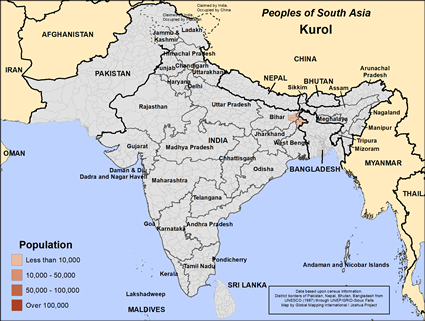Kurol in India

Send Joshua Project a photo
of this people group. |

Map Source:
People Group data: Omid. Map geography: UNESCO / GMI. Map Design: Joshua Project
|
| People Name: | Kurol |
| Country: | India |
| 10/40 Window: | Yes |
| Population: | 6,300 |
| World Population: | 6,300 |
| Primary Language: | Bengali |
| Primary Religion: | Hinduism |
| Christian Adherents: | 0.00 % |
| Evangelicals: | 0.00 % |
| Scripture: | Complete Bible |
| Ministry Resources: | Yes |
| Jesus Film: | Yes |
| Audio Recordings: | Yes |
| People Cluster: | South Asia Hindu - other |
| Affinity Bloc: | South Asian Peoples |
| Progress Level: |
|
Introduction / History
The Hindu Kurol people live primarily in the eastern states regions of India, particularly in Bihar and West Bengal. Historically, they have engaged in agriculture and small-scale trade, with many Kurol families relying on farming as their main source of livelihood. Over time, the Kurol have adapted to changing economic conditions, though agriculture continues to play a significant role in their communities. Some have moved into other trades or small businesses, while maintaining strong ties to their traditional practices.
What Are Their Lives Like?
The Kurol people primarily depend on agriculture, cultivating crops such as wheat, millet and pulses. They use both traditional farming methods and modern techniques, depending on the resources available in their region. Many families also keep livestock, including goats and cattle, which provide additional income and food security. The community often works together during planting and harvest seasons, with family members sharing responsibilities.
Most Kurol homes are simple and constructed from locally available materials, such as mud and brick. Villages are close-knit, with extended families living near one another and supporting each other in their daily tasks. While younger generations have begun seeking employment in nearby towns and cities, many Kurol families continue to live in rural areas, where agriculture remains central to their lives.
What Are Their Beliefs?
The Kurol people practice Hinduism and observe various religious festivals and rituals throughout the year. They worship deities like Vishnu, Shiva and Durga participating in major Hindu festivals such as Diwali, Navratri and Holi. Temples and local shrines serve as important centers for worship and community gatherings.
In addition to these mainstream practices, the Kurol people observe agricultural rituals to seek blessings for good harvests and the well-being of their livestock. Religious practices are closely tied to the seasons and cycles of farming, reflecting their deep reliance on the land.
What Are Their Needs?
The Kurol people face several challenges, particularly related to economic development, healthcare and education. Their reliance on traditional farming methods makes them vulnerable to environmental changes, such as droughts and unpredictable weather patterns, which can negatively impact crop yields. Access to improved irrigation systems, modern agricultural tools, and sustainable farming practices would help strengthen their livelihoods.
Education remains a critical need, especially in rural areas where schools may be under-resourced. Expanding educational opportunities would allow younger generations to explore alternative careers and improve their economic situation. Healthcare services are also limited, with many Kurol families relying on traditional remedies or traveling long distances for medical care. Programs focused on improving access to healthcare, education and agricultural support would greatly benefit the Kurol people.
Prayer Points
Pray for families of believers loving and serving others to grow reproducing churches.
Pray for a chain reaction of families reaching families that results in thousands of new believers who share their faith with others.
Pray for grace and truth expanding into the entire Kurol society as all believers learn to love others.
Pray that churches and believers will bless their entire people group in such a way that God's love will change the Kurol people like yeast changes dough.